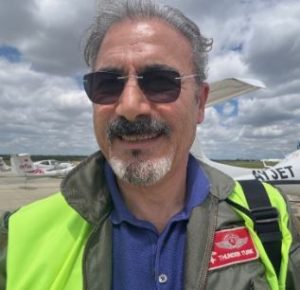 In this issue, The AFIT Foundation recognizes Colonel (Ret.) Efgan Dengür, Vice President of EDGE Advanced Concepts.
In this issue, The AFIT Foundation recognizes Colonel (Ret.) Efgan Dengür, Vice President of EDGE Advanced Concepts.
Colonel Dengür received his M.S. in Operations Research (GOR 92 M) from the U.S. Air Force Institute of Technology (AFIT) in March of 1992. As a young fighter pilot in the Turkish Air Force, Colonel Dengür was driven by an unwavering desire to excel—to be the “best stick.” Flying always felt like his true calling, a path he believed he was destined to follow- not just for himself but for service to his country.
In 1989, while flying the F-104 and having graduated at the top of Class ’87, Colonel Dengür was honored to be selected from among the elite graduates of the Turkish Air Force Academy between 1982 and 1989—those who had earned their wings as fighter pilots. He was pulled from his squadron and sent to AFIT, where he pursued a master’s degree in Operations Research alongside top minds from the USAF and allied nations. AFIT was transformative, sharpening his scientific thinking and reinforcing that discipline and perseverance can overcome even the toughest challenges. After returning, he served as a fighter pilot and instructor pilot, commanded an advanced jet training squadron, served as course director and instructor at the NATO School in Germany, and ultimately held a flag officer position until retiring as a full colonel. Along the way, Colonel Dengür also graduated from the Turkish Air Force Air Command and Staff College as a general staff officer and completed the Turkish Armed Forces College to lead operational-level commands.
After retiring from the Air Force in 2010, Colonel Dengür stood at a crossroads—either continue flying in commercial aviation or pursue a more challenging business career where he could transfer his operational, analytical, and leadership skills honed in the military. He chose the latter. Since then, Colonel Dengür has held executive roles, managing individual companies and groups of companies within the aviation sector. His journey led him to strategic leadership positions where he navigated complex business environments to drive growth and innovation. Today, Colonel Dengür serves as the Vice President of a Systems Engineering R&D company that contributes to the UAE’s defense industry—an arena where his background in operations research, systems thinking, and disciplined execution continues to add value to high-impact national programs.
Colonel Dengür still vividly remembers the welcome briefing during his first week at AFIT. What struck him most was the staggering divorce rate among graduates—nearly 70%—a sobering statistic that came with sound advice on balancing the intense demands of academic life with family responsibilities. He has deep respect for those who managed to persevere through the program while married; their resilience was nothing short of admirable. During his time at AFIT, he had the privilege of learning from truly exceptional academics, some of whom were teaching their own groundbreaking theories in mathematics and statistics. Interacting with such minds made him feel incredibly fortunate and intellectually challenged. One of the most defining moments was his thesis defense, which proposed a solution to a pressing requirement from the Pentagon. Colonel Dengür reflects that he will never forget the unfolding question posed during the defense—one that unlocked the broader potential of his research, extending its application far beyond its original scope to address other critical and unresolved needs.
AFIT had a profound and lasting impact on Colonel Dengür’s life by transforming the way he approaches problems—scientifically, critically, and fearlessly. It taught him how to apply scientific principles to real-world challenges and to always look for one more perspective before reaching conclusions. At AFIT, he learned that no hypothesis is too small or too bold to test. Whether he was optimizing traffic flow at a busy intersection by collecting data and running simulations, or later applying radar theory to survive and defeat air defense systems in combat scenarios, the tools and mindset he gained at AFIT proved invaluable. It instilled in him a habit of disciplined curiosity, a belief in data over assumption, and a confidence that any complex system—civilian or military—can be understood, modeled, and improved. These principles have guided Colonel Dengür throughout his career in aviation, executive leadership, and now in contributing to national defense through systems engineering.
Colonel Dengür’s advice to those who are considering entering the military is simple but powerful: do the right thing and do it right.
He writes, “This has been my guiding principle throughout my career, and the military instills it deeply into those who are willing to lead and serve. The armed forces shape future leaders by embedding this mindset into every decision, every mission, and every action.
In the military, you will be challenged—intellectually, morally, and operationally. Institutions like The Turkish Air Force Academy, the TURAF Air Command and Staff College and the Air Force Institute of Technology showed me that science and discipline go hand in hand, and that there is no problem too complex to analyze, simulate, and overcome if you approach it with rigor and resolve. The military trains you not only to ask the right questions but also to act decisively and ethically in answering them.
So, if you seek a path where your decisions matter, where leadership is earned through responsibility, and where your actions serve something greater than yourself, then the military is the right place for you. And remember—do the right thing, and do it right.” Thank you, Colonel Dengür!


Stay In Touch